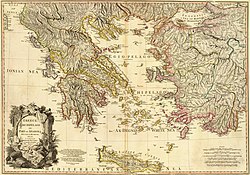| National Schism | |||||||
|---|---|---|---|---|---|---|---|
| Part of World War I | |||||||
 Eleftherios Venizelos (left) and King Constantine I (right) prior to the National Schism c. 1913 | |||||||
| |||||||
| Belligerents | |||||||
|
Supported by: |
Supported by: | ||||||
| Commanders and leaders | |||||||
|
Constantine I Ioannis Metaxas |
Eleftherios Venizelos Pavlos Kountouriotis Panagiotis Danglis | ||||||
| Casualties and losses | |||||||
| 100+ | 200–300 | ||||||
| 8,000 Greek soldiers surrendered to Central Powers | |||||||
| History of Greece |
|---|
 |
|
|
The National Schism (Greek: Εθνικός Διχασμός, romanized: Ethnikós Dichasmós), also sometimes called The Great Division, was a series of disagreements between King Constantine I and Prime Minister Eleftherios Venizelos regarding the foreign policy of Greece in the period of 1910–1922 of which the tipping point was whether Greece should enter World War I. Venizelos was in support of the Allies and wanted Greece to join the war on their side, while the pro-German King wanted Greece to remain neutral, which would further favor the plans of the Central Powers.
The disagreement had wider implications, since it would also affect the character and role of the king in the state. The dismissal of Venizelos by the King resulted in a deep personal rift between the two men, and in subsequent events their followers divided into two radically opposed political camps; this affected the wider Greek society.
After Bulgaria had entered the war against Serbia (already in a siege under Germany's and Austria-Hungary's combined attack), in September 1915, Venizelos achieved a vote on October 4 in the parliament for a call to conscription, honoring the alliance treaty between Greece and Serbia. The next day he was implicated[neutrality is disputed] in the invasion of Allied forces in Thessaloniki which would establish the Macedonian front to help Serbia, but the King refused to sign the conscription, accusing him of treason for the invasion in Salonika and forcing him to resign for a second time within that year (1915).
Eight months later, in May and June 1916, the palace counterweighted the grip of the Entente in Salonika with the unconditional surrender of a strong military fort along with half of the eastern part of Macedonia to the German-Bulgarian forces. The disagreements of the two men had now escalated towards a covert civil war. In August 1916, followers of Venizelos set up the Provisional Government of "National Defence" which included northern Greece, the Aegean Islands and Crete, and sided with Entente. This act, which effectively split Greece into north and south entities, had the aim to reclaim the trust of Entente along with the lost regions of Macedonia, and to regain control on northern Greece, gradually lost after the growing Army of the Orient had landed, one year earlier. After intense diplomatic negotiations, an armed confrontation in Athens between Allied and royalist forces with dozens of casualties, some due to lynching by a royalist paramilitary organization, and a subsequent five-month naval blockade upon the (southern part of the) Greek kingdom, King Constantine abdicated on 11 June 1917 (his eldest son George bypassed, for also being anti-Entente), and was succeeded by his second son Alexander as king. Venizelos returned to Athens on 29 May 1917, and Greece, re-unified but under French armistice, officially joined the war on the side of the Allies.
Although Greece emerged victorious and secured new territory by the Treaty of Sèvres, the bitter effects of this division were the main features of Greek political life until the 1940s, and contributed to Greece's defeat in the Greco-Turkish War, the collapse of the Second Hellenic Republic, the 1925 Coup d'etat by Pangalos and the dictatorial Metaxas Regime. The National Schism reflected the differences between the "New Greece" which gained after the Balkan Wars of 1912–13, consisting of Thrace, Macedonia, Epirus, Crete, and the North Aegean islands, and the "Old Greece" which consisted of the pre-1912 territories. In general, people in "New Greece" were pro-Venizelist while people in "Old Greece" were much pro-royalist.[1]
- ^ Kostis 2018, p. 277-278.